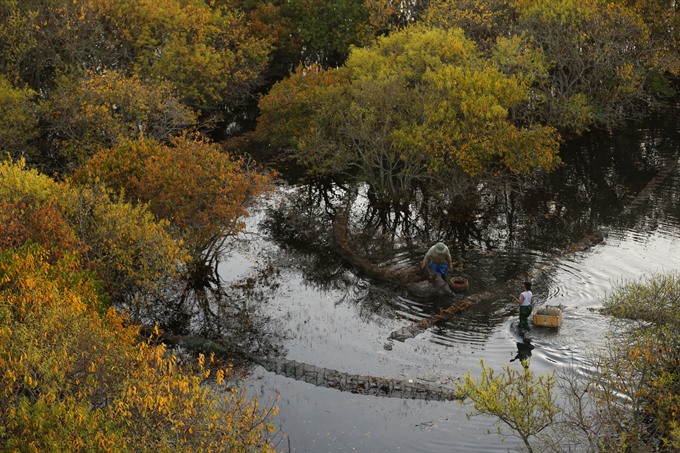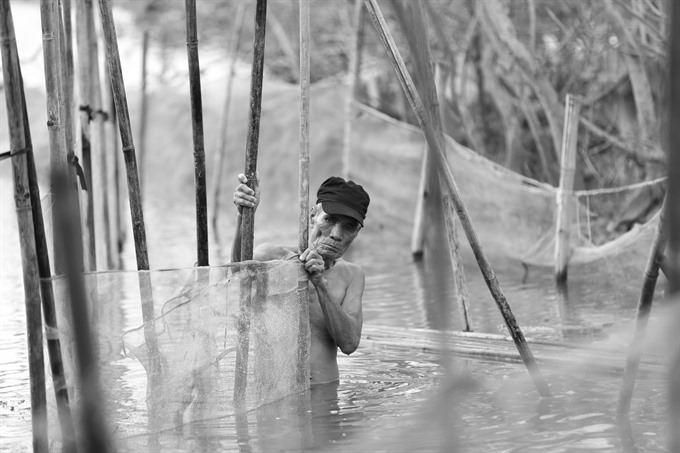 Society
Society

A 71-year-old man chose to live in an oasis that is far from his neighbors and unconnected to the power grid and water supply. He has lived this life for almost 30 years and remains content with it, as he guards a mangrove forest area.
 |
| The marsh islet during autumns. — VNS Photo Nguyễn Văn Sum |
by Phước Bửu
THỪA THIÊN- HUẾ — A 71-year-old man chose to live in an oasis that is far from his neighbors and unconnected to the power grid and water supply. He has lived this life for almost 30 years and remains content with it, as he guards a mangrove forest area.
Nguyễn Ngọc Đáp says living in the marsh islet Rú Chá was always good for him, and it has been even better as marsh resources helped to feed his 10 children. No power, no water supply, and an Internet connection is an understandable concept that has never existed in his mind, but Đáp always smiles while talking about his life.
“I feel contented with this. This marsh fed me and my children, so I have nothing to blame it for, even during the tough weather in the flooding season,” he says.
In 1988, Đáp brought his wife to settle down in Rú Chá, the remaining islet of a mangrove forest in central Thừa Thiên- Huế Province. Encroachment of land for aquaculture and the cultivation of soil by nearby residents had turned the forest into a small marsh islet with a population of chá trees (Excoecaria agallocha), a mangrove species.
In the 1980s, life was very difficult in his home village of Thuận Hòa in the province’s Hương Trà District. People did not have enough food to eat or wood for cooking fires, and there was no land for planting crops to feed growing families.
“I have 10 children, but the soil plot there was not large enough to cultivate. I thought the islet would be good, as no one would compete with me there in catching fish to feed my children,” says Đáp.
He then made the brave decision to leave his sons and daughters behind in the village to live on the islet. While the islet looks wild and isolated today, it was even wilder 30 years ago before the marsh man settled down on his site.
Behind the thick mangrove tree layer there are several tombs built for the dead, as well as an old temple for Mother Goddesses worshipping found in the black, muddy water.
“I wasn’t scared at all, thinking of food for the kids,” he says. But practice proved that Đáp was right. In the islet, he easily found fish, crustaceans, and amphibian species in abundance for the couple and his children. He and his wife managed to cultivate rice on the islet, as well.
In the middle of the islet, Đáp excavated land to make an earthen foundation, which is placed on a high spot to be safe from rising waters during the four-month flood season, with a cottage built on it to shelter the couple.
Year after year, Đáp had the feeling of ownership over the islet and the thought of the protection of the trees. Late at nights in the 1980s and 1990s, many reached the islet to cut down the trees for wood chucks and Đáp attempted to drive these poarchers away.
He said sometimes the poachers violently attacked him.
In recent years, youngsters flock to the islet for shade and photography, and Đáp has had to remind them to respect the trees. He is now considered the ‘forest guard’.
At 71, Đáp and his wife do not have any plans to return to his home village. He feels content with life at a site where there is not another human house within a 3km diameter. “I am familiar with this life,” he says. His wife is in total agreement with him, smiling and nodding her head, refusing to give her name as she says she is shy about being seen in newspapers.
Last year, the province authorities recognized Đáp’s attempts and named him the guard of the islet. They pay him some 50 dollar a year to watch over the trees. The humble amount makes Đáp feels content, because of the recognition.
“How much they pay me doesn’t matter. I love this life and I owe the islet for feeding my children, who are all grown up and married now. So I will stay here to watch out for the trees until my last breath,” the old man says. — VNS
 |
| Đáp as he fishes. — VNS Photo Nguyễn Văn Sum |









